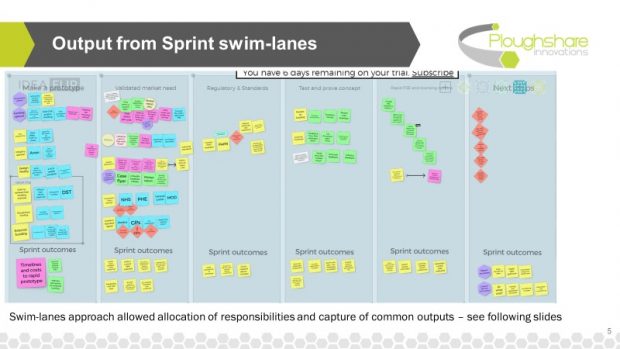Ploughshare Innovations was established in 2005 to commercialise and increase the impact of intellectual property generated from research at Dstl, their shareholder. Since its creation, Ploughshare has commercialised 126 technologies and launched thirteen spin-out companies, principally for civilian applications. Its license agreements have resulted in the creation of around 585 jobs, generated £222 million worth of exports, and attracted £140 million of investment.
We hear today from their CEO, Hetti Barkworth-Nanton, with reflections on some of the things they have been doing during COVID to apply new ways of working and thinking to drive greater impact with pace.
-----
Business transformation has always fascinated me and has been a large part of my approach in previous organisations. The very idea that you can take an existing methodology and apply it to a new sector to deliver improved performance is both exciting and rewarding. I think of it as the business version of when the England rugby team undertook training with the Royal Marines – only with less mud and different obstacles to climb.
I am now in the fortunate position to be leading the organisation that has unique access to innovations from across the Ministry of Defence. As Ploughshare Innovation’s new CEO, it has been a challenging introduction given that I started just as the coronavirus lockdown was initiated, so I am only just starting to meet my team properly!
Ploughshare has commercialised many innovations either by creating license deals or spin-out companies. From a novel coating designed to improve the performance of military clothing which is now used to waterproof mobile phones, to a fingerprint recovery technology which is set to revolutionise the work of forensics teams globally, we are fortunate enough to have access to a wide variety of defence and security innovations.
One such innovation that came to us at the start of the pandemic was a new design for a clinical face mask. The solution we had took a typical face mask and added additional protection by including an ‘air shield’ that would keep the airborne virus away from the user.
However, the obstacle we had to overcome was that a typical review cycle that included patent filing and grant, followed by market assessment and meetings with potential licenses would take more than a year – which would be too late for this innovation.

Agile commercialisation
We used Agile methodology (scrums, sprints or similar) in my last leadership role at Vodafone UK, driving 2 weekly sprints across four scrum teams to drive customer service improvements. So I have seen it work. But of course, that was in an environment where I could put all the people in a room for 2 weeks.
We know that Agile methodology is great when you have a clear outcome to achieve and a cross-functional, multi-skilled, team is needed to resolve it. I am delighted to say the team jumped at it, and our Commercial Manager, Robin Williamson, took it upon himself in just a matter of 2 or 3 days to research some of the Agile principles and even found productivity tools to enable the ‘virtual scrum team’ to collaborate.
The sprint ran for 5 days, by the end of which the innovation had been fully reviewed, a patent had been filed, marketing collateral developed, prospective customers approached and expressed interest, and a development plan for what was still an early-stage invention had been created.
We are now two months down the line, and Ploughshare is finalising terms to sign a licence deal for the innovation. This is the first step to the mask being able to be used as PPE in support of front-line staff during the coronavirus pandemic, and beyond that, into the first responder, defence, and industrial markets.

Outcomes and urgency
In summary, it took just 2.5 months from the invention disclosure to license negotiations, which is pretty outstanding.
We have had similar success with our spin-out company, Presymptom Health, where we have moved rapidly over the last two months to identify a development path to help triage coronavirus patients for sepsis. We have managed to advance the development by at least 18 months; however, this was achieved not by using Agile but just by asking a different question. By changing ‘How long is the plan?’ to ‘How quickly can we get this to patients?’ we change the way we think about the plan.
Agile methodology has its place, particularly in the early ‘evaluation’ stages of commercialisation. It helps you to move fast, and also fail fast which prevents ideas from hanging around for months on end. Over the next few months, we will be looking at Agile as part of developing the ‘Ploughshare Blueprint’ and formalising its role in our model.
We should not ignore the fact that a crisis creates a sense of urgency, not just in a few people, but in the whole eco-system, which undoubtedly makes things like this more achievable. However, there are 2 ways whereby the lessons from this can really start to change things permanently, in my view.
- Create a sense of urgency. In both the cases highlighted above, and indeed with subsequent work, we are starting to create an impatience in our culture, and the question all my team are learning to expect is ‘why can’t it be done quicker’.
- Measuring the impact creates a burning platform. What do I mean by this? Well take sepsis as an example. Instead of saying ‘How long does the development need to be?’, try asking ‘How quickly can the solution be delivered to patients to save their lives?’ In other words, what we really care about is speed to the patient. Around 11 million people are dying of sepsis globally every year, and assuming our diagnostic tool saves just 1% of those, our work can have a huge benefit for those individuals and their families. Our acceleration of this technology will save lives.
If you have a high impact innovation which is stuck in quicksand, we would love to free it up with you to deliver its benefits earlier. Let us know in the comments section below or email us at info@ploughshareinnovations.com
Leave a comment